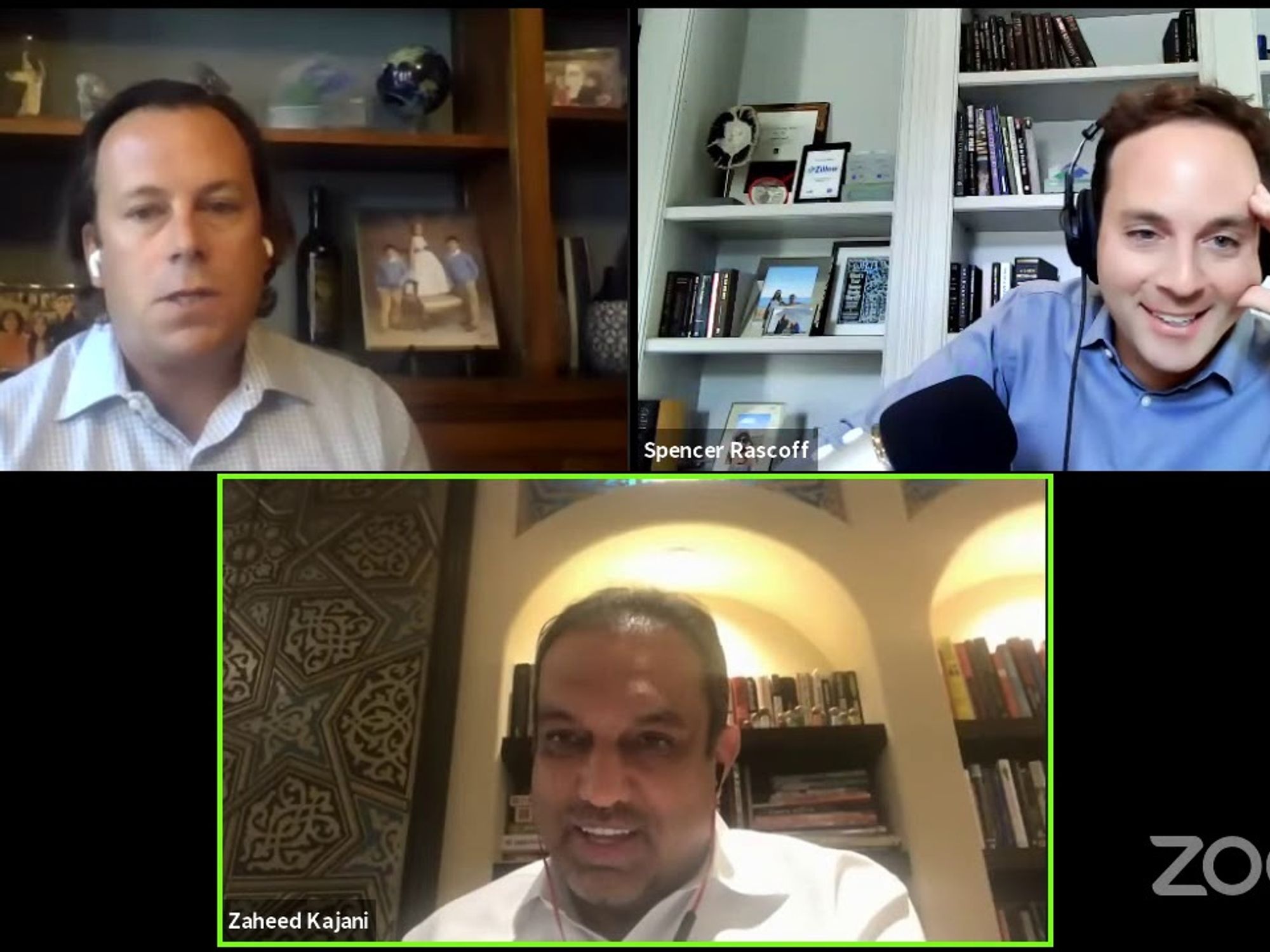Watch: Why Are Tech Markets Booming While the Economy Reels?
Spencer Rascoff serves as executive chairman of dot.LA. He is an entrepreneur and company leader who co-founded Zillow, Hotwire, dot.LA, Pacaso and Supernova, and who served as Zillow's CEO for a decade. During Spencer's time as CEO, Zillow won dozens of "best places to work" awards as it grew to over 4,500 employees, $3 billion in revenue, and $10 billion in market capitalization. Prior to Zillow, Spencer co-founded and was VP Corporate Development of Hotwire, which was sold to Expedia for $685 million in 2003. Through his startup studio and venture capital firm, 75 & Sunny, Spencer is an active angel investor in over 100 companies and is incubating several more.

Why is the stock market up if the economy is getting crushed? With so many people out of work, how is it that the market is soaring, by some estimates, to its highest point ever?
Spencer Rascoff, executive chairman at dot.LA, spoke with senior tech-focused executives at investment firm Evercore to discuss what's behind the trends. John Scuorzo, Evercore's senior managing director joined Zaheed Kajani, senior managing director at Evercore to break down Wall Street's perspective on what's happening in the current tech capital markets.
The two say there are several factors contributing to Wall Street's optimism. First, the enormous stimulus coming from governments.
"I think that the biggest and probably the most important driver of this is just the massive stimulus that all the central banks globally have put into the economy," Kajani said. "There is somewhere where this money has to go. If you've got more money chasing fewer assets, that drives price up."
Copy of dot.LA Strategy Session: Wall Street's Perspective
Also contributing, the two said, are several other factors, including low interest rates, international investment, and optimism for what cutbacks and introduction of new technology will mean for many companies' future profits.
"People generally have an allocation towards equities and bonds," said Kajani. "And because the rates are so low, your bonds just don't give you the same return. And that's driven even more capital into the equity markets."
That's been true overseas as well, where investors are looking for safe places to put their money, and the U.S. market appears like a good bet.
"If you have capital in Europe, or in Asia, which other market do you feel is the most stable in the safest market?" Kajani said, "And so, many people who follow the market closely often see the futures up every morning when you wake up. A lot of that money is coming from overseas capital that's entering the U.S. market."
Companies who have made cuts and had to incorporate new technology into their workflow as part after the lockdowns, may also be finding themselves becoming more productive as a result, even with a (temporary or permanent) reduction in staff.
"I think a lot of companies have realized they're being as productive with fewer people and using technology," Kajani said. "I think that actually may increase profits."
All that together, along with optimism that a vaccine will eventually solve many of the problems the world is currently facing, is helping to create the frenzy that the world is seeing on Wall Street, the two said.
Scourzo said that Evercore's projections point in that direction as well.
"Our data suggests that we exited the recession in May, and we're back to an expansionary period, though the cut was deep," he said. "We think we think we're moving in the right direction with the economy only, we estimate, 35% reopened,"
Keep up with the tech and startup world in L.A. and beyond. Sign up for our newsletter to learn about new events, and subscribe to ourYoutube channel to get the latest event videos
About the Speakers
John Scuorzo , Senior Managing Director of Evercore
John Scuorzo is a senior managing director and the Head of Technology Equity Capital Markets at Evercore, with responsibility for the origination and execution of equity and equity-linked transactions for the firm's global technology clients.
Mr. Scuorzo has been a trusted advisor to technology companies for nearly 20 years, most recently as managing director with Citigroup, where he ran its technology equity capital markets business.
Mr. Scuorzo has been at the forefront of the evolution of capital formation for most of his career and is recognized as one of the most experienced and innovative capital markets professionals in the Technology sector. Mr. Scuorzo has advised hundreds of leading companies across the globe, including Alibaba, Broadcom, CoStar, Despegar, Dynatrace, Facebook, Fastly, Globant, GoDaddy, GoPro, Grubhub, Guidewire, Microsoft, Ping Identity, Paypal, Palo Alto Networks, Pinterest, Presidio, Sailpoint, Slack, The Trade Desk, Uber, Upwork, Roku, Vmware, Wayfair and Zillow.
Mr. Scuorzo graduated from Georgetown University with a B.S. in business administration with a major in finance.
Zaheed Kajani, Senior Managing Director of Evercore
Zaheed Kajani is a senior managing director in the firm's technology corporate advisory business and leads the global internet and digital media practice. Zaheed was most recently a managing director and global head of internet and digital media at Citi. With almost two decades of experience, Zaheed has advised on over a 100 transactions in the sector. He has worked with companies raising private capital, public capital through IPOs, follow-ons and converts, as well as M&A.
Zaheed has an M.B.A. from UCLA's Anderson School of Management, a J.D. from UC Berkeley's School of Law and a B.A. in political science from U.C. Berkeley.

Spencer Rascoff, Executive Chairman of dot.LA
Spencer Rascoff, Executive Chairman of dot.LA
Spencer Rascoff is an entrepreneur and company leader who co-founded Zillow, Hotwire and dot.LA, and who served as Zillow's CEO for a decade. He is currently executive chairman of dot.LA and a board member at TripAdvisor. In the fall of 2019 Spencer was a visiting executive professor at Harvard Business School where he co-taught the "Managing Tech Ventures" course. In 2015, Spencer co-wrote and published his first book, the New York Times' best seller "Zillow Talk: Rewriting the Rules of Real Estate." Spencer is the host of "Office Hours," a monthly podcast on dot.LA featuring candid conversations between prominent executives on leadership, diversity and inclusion, and startups.
- Founders and Investors Do Not Share Wall Street's Optimism - dot.LA ›
- Tech Markets Boom While Economy Reels - dot.LA ›
Spencer Rascoff serves as executive chairman of dot.LA. He is an entrepreneur and company leader who co-founded Zillow, Hotwire, dot.LA, Pacaso and Supernova, and who served as Zillow's CEO for a decade. During Spencer's time as CEO, Zillow won dozens of "best places to work" awards as it grew to over 4,500 employees, $3 billion in revenue, and $10 billion in market capitalization. Prior to Zillow, Spencer co-founded and was VP Corporate Development of Hotwire, which was sold to Expedia for $685 million in 2003. Through his startup studio and venture capital firm, 75 & Sunny, Spencer is an active angel investor in over 100 companies and is incubating several more.





 Image Source: Valar Atomics
Image Source: Valar Atomics Image Source: Waymo
Image Source: Waymo Image Source: Apple
Image Source: Apple
